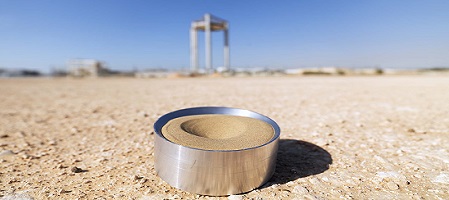The Masdar Institute of Science and Technology, an independent, research-driven graduate-level university focused on advanced energy and sustainable technologies, today announced that its researchers have successfully demonstrated that desert sand from the UAE could be used in concentrated solar power (CSP) facilities to store thermal energy up to 1000°C.
The research project called ‘Sandstock’ has been seeking to develop a sustainable and low-cost gravity-fed solar receiver and storage system, using sand particles as the heat collector, heat transfer and thermal energy storage media.
Desert sand from the UAE can now be considered a possible thermal energy storage (TES) material. Its thermal stability, specific heat capacity, and tendency to agglomerate have been studied at high temperatures.
Dr. Behjat Al Yousuf, Interim Provost, Masdar Institute, said, “The research success of the Sandstock project illustrates the strength of our research and its local relevance. With the launch of the MISP in November, we have further broadened the scope of our solar energy research and we believe more success will follow in the months ahead.”
A research paper on the findings developed under the guidance of Dr. Nicolas Calvet, Assistant Professor, Department of Mechanical and Materials Engineering, was presented by PhD student Miguel Diago at the 21st Solar Power and Chemical Energy Systems (SolarPACES 2015) Conference in South Africa. The paper was co-authored by alumni Alberto Crespo Iniesta, Dr. Thomas Delclos, Dr. Tariq Shamim, Professor of Mechanical and Materials Engineering at Masdar Institute, and Dr. Audrey Soum-Glaude (French National Center for Scientific Research PROMES CNRS Laboratory).
Replacing the typical heat storage materials used in TES systems — synthetic oil and molten salts — with inexpensive sand can increase plant efficiency due to the increased working temperature of the storage material and therefore reduce costs. A TES system based on such a local and natural material like sand also represents a new sustainable energy approach that is relevant for the economic development of Abu Dhabi’s future energy systems.
The analyses showed that it is possible to use desert sand as a TES material up to 800-1000 °C. The sand chemical composition has been analyzed with the X-ray fluorescence (XRF) and X-ray diffraction (XRD) techniques, which reveal the dominance of quartz and carbonate materials. The sand’s radiant energy reflectiveness was also measured before and after a thermal cycle, as it may be possible to use the desert sand not only as a TES material but also as a direct solar absorber under concentrated solar flux.
Dr Nicolas Calvet said: “The availability of this material in desert environments such as the UAE allows for significant cost reductions in novel CSP plants, which may use it both as TES material and solar absorber. The success of the Sandstock project reflects that usability and practical benefits of the UAE desert sand.”
In parallel to sand characterization, a laboratory scale prototype was tested with a small solar furnace at the laboratory of PROMES CNRS 1 MW solar furnace in Odeillo, France. Masdar Institute alumnus Alberto Crespo Iniesta was in charge of the design, construction, and experiment.
The next step of the project is to test an improved prototype at the pre-commercial scale at the Masdar Institute Solar Platform (MISP) using the beam down concentrator, potentially in collaboration with an industrial partner.
Reference:
This article has been published here by the PVBuzz Media team from the original news release from Masdar Institute of Science and Technology.
About Masdar Institute
The Masdar Institute of Science and Technology (Masdar Institute) was established by the government of Abu Dhabi as a not-for-profit, private graduate university to develop indigenous R&D capacity in Abu Dhabi addressing issues of importance to the region.
In collaboration with the Massachusetts Institute of Technology (MIT), Masdar Institute has developed an academic and research platform that articulates its mission and vision according to critical energy and sustainability challenges.
An important characteristic of Masdar Institute is its focus on complex real-world problems that require a multidisciplinary approach for the development of solutions from an integrated technology, systems and policy perspective. This multi-interdisciplinary and integrated approach is supported by the structure of its academic programs and by the emphasis placed on engaging external partners from industry, government, and other academic institutions in collaborative activities.
Serving as a key pillar of innovation and human capital, Masdar Institute remains fundamental to Masdar’s core objectives of developing Abu Dhabi’s knowledge economy and finding solutions to humanity’s toughest challenges such as climate change.
Masdar Institute integrates theory and practice to incubate a culture of innovation and entrepreneurship, working to develop the critical thinkers and leaders of tomorrow. With its world-class faculty and top-tier students, the Institute is committed to finding solutions to the challenges of clean energy and climate change through education and research.














Comments